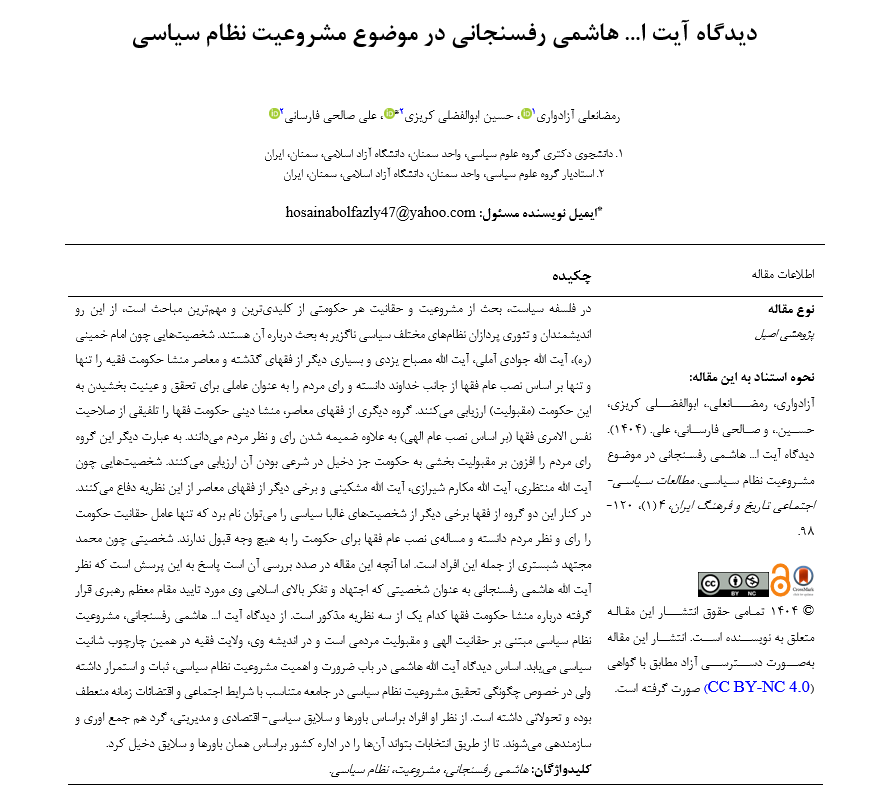Ayat Hashemi Rafsanjani's view on the legitimacy of the political system
Keywords:
Hashemi Rafsanjani, legitimacy, political systemAbstract
In the philosophy of politics, the discussion of the legitimacy and legitimacy of any government is one of the most key and important topics, therefore the thinkers and theoreticians of different political systems are bound to discuss it. Personalities such as Imam Khomeini (RA), Ayatollah Javadi Amoli, Ayatollah Misbah Yazdi and many other past and contemporary jurists considered the origin of the jurisprudence to be solely based on the general installation of jurists by God and the people's vote as a factor for They evaluate the realization and objectification of this government (popularity). Another group of contemporary jurists consider the religious origin of the rule of jurists to be a combination of the jurisdiction of the jurists' self-determination (based on the divine decree) plus the addition of the people's opinion. In other words, this group evaluates the people's vote in addition to the acceptability of a part of the government, but also the involvement in its Shariah. Personalities such as Ayatollah Montazeri, Ayatollah Makarem Shirazi, Ayatollah Meshkini and some other contemporary jurists defend this theory. In addition to these two groups of jurists, some other mostly political figures can be mentioned who consider the people's opinion and vote as the only factor in the legitimacy of the government and do not accept the issue of installing general jurists for the government in any way. A person like Mohammad Mojtahed Shabestri is one of these people. But what this article aims to investigate is the answer to the question, which one of the three mentioned theories is the opinion of Ayatollah Hashemi Rafsanjani, as a person whose ijtihad and high Islamic thinking has been approved by the Supreme Leader, about the origin of the rule of jurisprudence. . From Ayat Hashemi Rafsanjani's point of view, the legitimacy of the political system is based on divine righteousness and popular acceptance, and in his opinion, the authority of the jurist finds political dignity in this framework. The basis of Ayatollah Hashemi's view on the necessity and importance of the legitimacy of the political system has been stability and continuity, but regarding how to investigate the legitimacy of the political system in the society, it has been flexible and has undergone changes in accordance with the social conditions and requirements of the time. According to him, people are gathered and organized based on political-economic and managerial beliefs and tastes. so that he can involve them in the administration of the country based on the same beliefs and tastes through elections.
Downloads
References
Ali Hosseini Abbasi, M. R., Mortazavi Asl, S. K., & Sinaii, S. A. (2023). Analytical-critical review of Ayatollah Akbar Hashemi Rafsanjani's approach and way of acting in Tehzb and democracy. Approach to the Islamic Revolution, 17(62), 87-106.
Alizade, H. (1998). Special culture of political science. Tehran: Aperture.
Bashiriyeh, A. (2007). Revolution and Victory. Tehran: Maarif of Revolution.
Bashiriyeh, A. (2013). The days of stability. Tehran: Maarif El-Ghebanal.
Bashiriyeh, H. (2004). Teaching Political Knowledge. Tehran: Contemporary View.
Hashemi Rafsanjani, A. (2007). Passing through the crisis. Tehran: Maarif of the Revolution.
Hashemi Rafsanjani, A. (2010). A detailed list of speeches of the Expediency Recognition Forum.
Mahmoudinia, A. (2018). Researching the policies and performance of the government in the Islamic Republic of Iran Senior thesis, Qazvin, Imam Khomeini University].
Martin, J. (2008). The Poulantzas Reader: Marxism, Law and the State. London: Verso.
Rahmani, A. (2010). Western Studies. Tehran: Imam Khomeini Educational and Research Institute.
Ritzer, J. (1999). Sociological theories in the contemporary era. Tehran: Scientific Publications.
Saeedi Rooh, E.-A. (2010). An analysis of Hashemi Rafsanjani's positions in the 10th presidential election Tehran: Islamic Revolution Documentation Center].
Shakuri, A., & Maadikhah, A. M. (1999). Tehiz and the Islamic Republic from the perspective of Ayatollah Hashemi Rafsanjani. Yad magazine(53, 54, 55, 56).
Valadbeygi, A. S. (2010). Examining the relationship between Islam and pragmatism: Islamic pragmatism. Zamane magazine(93).








